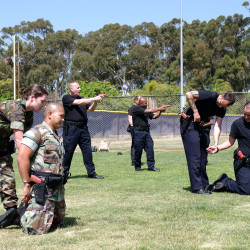
Working as a correctional officer doesn’t always require that you have a degree in criminal justice. In fact, to get a basic entry-level job at a state correctional facility, you often don’t need to earn anything beyond a high school diploma or obtain your GED. Having an associate degree or even a bachelor’s degree in criminal justice or a related field will help, of course, and is often necessary for advancement and higher pay, but it’s not a requirement.
You don’t necessarily have to have a degree in criminal justice to work for the Federal Bureau of Prisons (BOP) either. Federal positions often require a four-year degree, but that degree can be in fields such as psychology, sociology, or a similar area. Nonetheless, there are some real tangible benefits to having a degree in criminal justice if you plan on working as a correctional officer.
You’ll Be Ahead in Your Training
With a degree in criminal justice (even a two-year degree) you’ll be ahead of many of your peers in your academy training class. You’ll already be familiar with most of the introductory concepts taught in the early stages of academy training, and will have been exposed to some of the commonly used terminology and procedures taught at the academy.
Most of the classroom training courses such as criminal rights, corrections ethics, and the legal aspects of corrections will cover material you’re already familiar with. Since you’ll have taken basic writing courses while pursuing your degree, you should also do very well in the part of the training that covers report writing. This doesn’t mean you can skip those courses. But, if you do well and earn high grades, having a basic knowledge of writing does mean you may have less studying to do than your fellow correctional officers. Even so, you do need to pay attention, because there may be materials covered in these courses that you don’t know, even if your criminal justice degree was focused on corrections.
You’ll have Advanced Knowledge
In addition to being ahead of the class in many areas of training, you’ll also have extra knowledge that isn’t covered in training. This is especially true if you have a four-year degree since you will have taken a number of courses both in your major and in completing your general education requirements.
Some of your knowledge may be in other areas that aren’t directly related to criminal justiceIf you Unfortunately, mental health care in most correction facilities focuses on stabilizing inmates rather than treating inmates. For instance, an inmate experiencing extreme psychosis may need medication to control his or her symptoms, but inmates with depression or anxiety issues may go untreated. For this reason, a thorough understanding of human psychology and the effects of imprisonment on inmates is beneficial while in school and when applying for work.
You Will Be Ready to Advance
Upper level corrections positions often require a bachelor’s degree or even a master’s degree, so if you plan on making corrections your long-term career, entering the field with a degree puts you one step further to your goal of working your way up the ladder. This is especially true if you want to move into a supervisory or management position in the future. Corrections officers who have earned a master’s degree in criminal justice or a closely-related field have the opportunity for higher pay and advancement, and may be promoted to correctional warden, sergeant, or another position at the management or administrative level.








